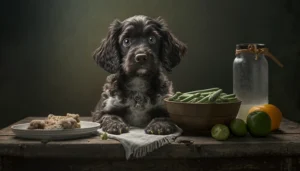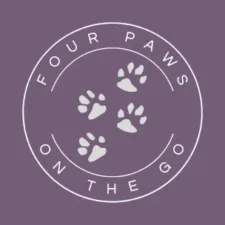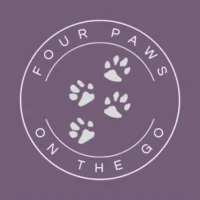Which Foods Are Dangerous for Dogs?

As a pet owner, it’s important to be mindful of what you feed your furry friend. Whilst training to be a Worthing dog walker I was surprised at just how many foods are potentially lethal. While some human foods can be safe for dogs to eat, others can be downright dangerous. In fact, certain foods can cause serious health problems, and even death, in dogs.
To help keep your pet safe, we’ve compiled a list of foods that are dangerous for dogs:
Chocolate
Most dog owners know that chocolate is off-limits for their pets. Chocolate contains a compound called theobromine, which can cause vomiting, diarrhoea, and even death in dogs. The severity of the symptoms depends on the amount of chocolate consumed and the size of the dog.
Dark chocolate and baking chocolate are particularly dangerous, as they contain higher levels of theobromine than milk chocolate. Even small amounts of chocolate can be harmful to some dogs, so it’s best to keep all chocolate out of reach.
Grapes and raisins
Grapes and raisins may seem like harmless snacks, but they can actually be toxic to dogs. Consuming these fruits can cause kidney failure, which can be fatal. The exact cause of the toxicity is unknown, but it’s best to err on the side of caution and avoid giving your dog grapes or raisins altogether.
Onions and garlic
Onions and garlic contain compounds that can cause oxidative damage to a dog’s red blood cells. This can lead to anaemia, which can cause weakness, lethargy, and even death. The toxicity of onions and garlic depends on the amount consumed and the size of the dog. While small amounts may not cause harm, it’s best to avoid giving your dog any form of onion or garlic.
Avocado
While avocados may be a healthy snack for humans, they can be dangerous for dogs. Avocados contain a substance called Persin, which can cause vomiting and diarrhoea in dogs. In addition, the large seed in the centre of the avocado can pose a choking hazard. It’s best to keep avocados out of reach of your furry friend.
Macadamia nuts
Macadamia nuts can be toxic to dogs, causing symptoms such as weakness, vomiting, and hyperthermia (high body temperature). In severe cases, consuming macadamia nuts can cause tremors, seizures, and even death. It’s best to keep all forms of macadamia nuts away from your dog.
Alcohol
Alcohol is toxic to dogs, just as it is to humans. Even small amounts of alcohol can cause vomiting, diarrhoea, and difficulty breathing in dogs. In severe cases, alcohol consumption can lead to coma and death. It’s best to keep all alcoholic beverages out of reach of your furry friend.
Cooked bones
While raw bones may be a healthy treat for dogs, cooked bones can be dangerous. Cooked bones can splinter and cause choking, obstruction, or perforation of the digestive tract. In addition, cooked bones can also cause dental problems. It’s best to avoid giving your dog cooked bones altogether.
Fatty foods
Foods that are high in fat can cause gastrointestinal upset in dogs, including vomiting and diarrhoea. In addition, consuming large amounts of fatty foods can lead to pancreatitis, a serious condition that can cause abdominal pain and organ damage. It’s best to avoid giving your dog fatty foods, such as bacon and fried chicken.
Xylitol
Xylitol is a sugar substitute that is often used in sugar-free gum, candy, and baked goods. Xylitol can be extremely toxic to dogs, causing symptoms such as vomiting, loss of coordination, and seizures. In severe cases, xylitol consumption can cause liver failure and even death. It’s important to read labels carefully and avoid giving your dog any products that contain xylitol.
Caffeine
Caffeine is a stimulant that can cause increased heart rate, hyperactivity, and seizures in dogs. In severe cases, caffeine consumption can even lead to death. It’s important to keep all caffeinated products, such as coffee and tea, out of reach of your furry friend.
Dairy products
While some dogs can tolerate small amounts of dairy, others are lactose intolerant and can experience gastrointestinal upset when consuming dairy products. Symptoms can include diarrhoea, vomiting, and abdominal pain. If you want to give your dog dairy, it’s best to start with a small amount and monitor their reaction closely.
Salt
Consuming large amounts of salt can be dangerous for dogs, just as it can be for humans. Excessive salt intake can lead to dehydration, vomiting, diarrhoea, and even seizures. It’s best to avoid giving your dog salty foods, such as potato chips and pretzels.
Raw food
While some dog owners swear by raw food diets for their pets, others caution against them. Raw foods can contain harmful bacteria such as salmonella and E. coli, which can cause serious gastrointestinal upset in dogs. In addition, feeding a dog a raw food diet can increase their risk of developing a nutritional deficiency, as the diet may not provide all the necessary nutrients that a dog requires.
Sugary foods
Just as with humans, consuming sugary foods can lead to health problems in dogs. Sugary foods can cause obesity, dental problems, and diabetes. In addition, many sugary foods contain xylitol, a substance that is toxic to dogs (as mentioned above).
Human medications
While not a food, it’s important to mention that human medications can be extremely dangerous to dogs. Dogs should never be given human medications unless under the guidance of a veterinarian. Many human medications, including painkillers and antidepressants, can cause serious harm to dogs and even be fatal.
Conclusion
If you suspect that your dog has ingested a dangerous food or substance, it’s important to contact your veterinarian immediately. Sometimes the cause may be suspect – unfortunately many people have found whilst on a dog walk their dog eats a plant or flower which could do them great harm. Depending on the severity of the symptoms, your veterinarian may recommend inducing vomiting, administering activated charcoal, or providing supportive care.
Prevention is the best way to protect your furry friend from dangerous foods. Keep all human foods out of reach of your dog, and make sure your family and guests are aware of which foods are off-limits. If you want to give your dog human food as a treat, make sure it’s a safe and healthy option. Consult with your veterinarian to ensure that your dog’s diet is providing all the necessary nutrients, and avoid feeding your dog table scraps or leftovers.
In conclusion, there are many foods that are dangerous for dogs, and it’s important for pet owners to be aware of them. With proper care and attention, you can help keep your furry friend healthy and safe. By following these guidelines, you can ensure that your dog stays happy and healthy for years to come.
Contact Form
contact@fourpawsonthego.com
Call Me
07533 919835


